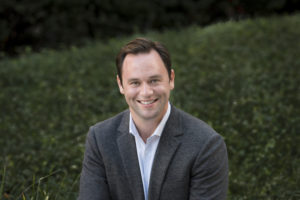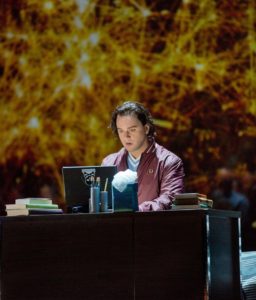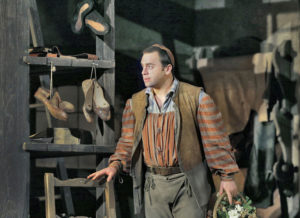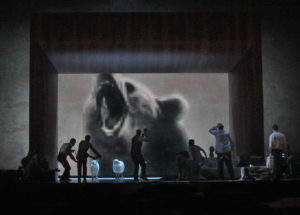
A scene from Act III of Adès’ “The Exterminating Angel.” Photo: Ken Howard/Metropolitan Opera
(A quick note: I posted my thoughts about the Met Opera in a separate post.)
Composers like Philip Glass, John Adams, Nico Muhly, Brett Dean, and Thomas Adès, to name a few, have been instrumental in blowing the doors open on preconceived notions of opera.
The work of British composer Adès has been particularly in the news the last little while, what with his opera adaptation of Luis Buñuel’s surreal 1962 film The Exterminating Angel recently making waves at the Metropolitan Opera in New York. The film, which revolves around a post-opera dinner party during which guests find themselves unable to leave, has accurately been described as a “a surreal, black comedic-horror film.” Film critic Roger Ebert called it a “macabre comedy.” The heavily symbolic work notable for several reasons, among them, as Vulture’s Justin Davidson writes, it “resurrected the surrealism of the 1920s and anticipated the psychedelia of the ’60s.” Having seen it in film school years ago, I remember it being, by turns, hilarious, bizarre, and very unsettling.
The opera translation is no less effective. Having premiered at the Salzburg Festival last year, the opera (with a libretto in English) went on to be staged at the Royal Opera in London this past spring and, when presented in New York last month, inspired waves of strong reactions, from high praise to brutal dismissal. As classical writer Joseph So rightly noted, “(a)udiences do appreciate contemporary operas when given fine singing and thoughtful staging.” Love it or hate it, The Exterminating Angel is a work that can’t be ignored. A work based on a movie that goes back to being filmed is interesting in and of itself; what would Buñuel make of it? I wondered this at news of the Live In HD Broadcast of The Exterminating Angel. The Spanish director might, I suspect, have been very amused to have noted his film had been translated to the stage, only to be translated back to film again. The meta nature of it all is enough to make one run to the work of French theorist Roland Barthes (almost).
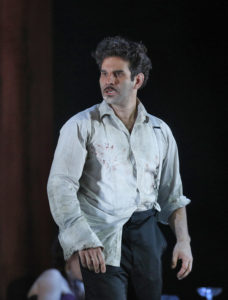
Frédéric Antoun as Raúl Yebenes in Adès’ “The Exterminating Angel.” Photo: Ken Howard/Metropolitan Opera
The Exterminating Angel (the opera) repeats in cinemas throughout December and January (and in Canada too) in case your saccharine silly season needs spicing up. The broadcast is not the first time Frédéric Antoun has been on the screen this year. The Quebec-born tenor appeared earlier this summer as Cassio in the Royal Opera House production of Othello, which was broadcast live (and in various repeats) internationally from Covent Garden in London.
A graduate of the prestigious Curtis Institute of Music, Philadelphia, Frédéric has an impressive resume that includes performances at Opéra de Paris, Theater an der Wien (Vienna), La Monnaie Brussels, the aforementioned Royal Opera House Covent Garden, a number of regional French houses, as well as Opernhaus Zurich, where he’ll be returning to perform early next year in Ravel’s lovely work L’Heure espagnole. Before that, he’ll be in Toronto, performing as part of the Toronto Symphony’s annual presentation of Handel’s Messiah. He has performed in works by Massenet, Mozart, Donizetti, Bizet, Verdi, and Handel; I particularly love this clip of him from a modern production of Gluck’s Iphigénie en Aulide, directed by Pierre Audi from 2011. Concert repertoire includes work by Berlioz, Handel, Schumann, and Bach, to name a few.
As you’ll hear, Frédéric is extremely familiar with the work of Thomas Adès, having already been in his operatic adaptation of The Tempest. With movie-star looks, rich-hued tenor, crisp diction, and a complete magnetism in both modern and not-so-modern productions, Frédéric is a singer to watch, both live and on the screen — either way, it’s a memorable experience.

